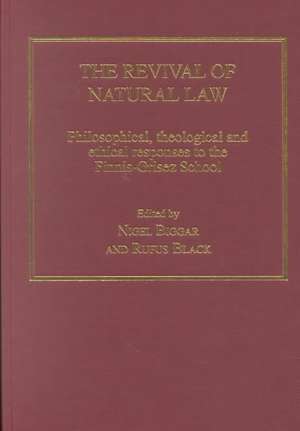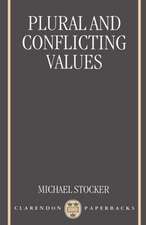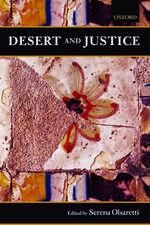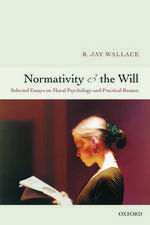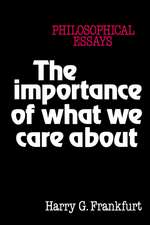The Revival of Natural Law: Philosophical, Theological and Ethical Responses to the Finnis-Grisez School
Autor Nigel Biggar, Rufus Blacken Limba Engleză Hardback – 29 dec 2000
| Toate formatele și edițiile | Preț | Express |
|---|---|---|
| Paperback (1) | 489.26 lei 6-8 săpt. | |
| Taylor & Francis – 11 noi 2016 | 489.26 lei 6-8 săpt. | |
| Hardback (1) | 769.55 lei 6-8 săpt. | |
| Taylor & Francis – 29 dec 2000 | 769.55 lei 6-8 săpt. |
Preț: 769.55 lei
Preț vechi: 1105.92 lei
-30% Nou
Puncte Express: 1154
Preț estimativ în valută:
147.25€ • 153.76$ • 121.60£
147.25€ • 153.76$ • 121.60£
Carte tipărită la comandă
Livrare economică 15-29 aprilie
Preluare comenzi: 021 569.72.76
Specificații
ISBN-13: 9780754612629
ISBN-10: 0754612627
Pagini: 320
Dimensiuni: 156 x 234 mm
Greutate: 0.75 kg
Ediția:1
Editura: Taylor & Francis
Colecția Routledge
Locul publicării:Oxford, United Kingdom
ISBN-10: 0754612627
Pagini: 320
Dimensiuni: 156 x 234 mm
Greutate: 0.75 kg
Ediția:1
Editura: Taylor & Francis
Colecția Routledge
Locul publicării:Oxford, United Kingdom
Cuprins
Contents: Introduction: The new natural law theory, Rufus Black; Part 1: Philosophical Issues: Natural law revived: natural law theory and contemporary moral philosophy, Timothy Chappell; Grisez and Thomism, Ralph McInerny; The basic dimensions of human flourishing: a comparison of accounts, Sabina Alkire; John Finnis on moral absolutes, Oliver O’Donovan; Part II: Theological Dimensions: Is Grisez’s moral theology rationalistic? Free Choice, the human condition, and Christian ethics, Göran Bexell; Is the new natural law theory Christian?, Rufus Black; Karl Barth and Germain Grisez on the human good: an ecumenical rapprochement, Nigel Biggar; Grisez’s ecclesiology, the role of moral theologians, and the scope for responsible dissent, Bernard Hoose; Part III: Moral Fields: Respect for life in Germain Grisez’s moral theology, Dave Leal; Natural sex: Germain Grisez, sex and natural law, Gareth Moore, O.P.; Grisez on sex and gender: a feminist theological perspective, Lisa Sowle Cahill; The moral standing of nature and the new natural law, Michael Northcott; Conclusion, Nigel Biggar; Index.
Recenzii
'... when such a sustained attempt at establishing a complete moral theory is made, it is surely to be welcomed... a very worthwhile collection. Arguments are taken seriously, and assessed carefully and eirenically on their merits rather than on their alleged orthodoxy... The editors have done us a service both in their choice of topic for the volume, and in their choice of contributors.' Studies in Christian Ethics '... an interesting systematic treatment...' Themelios 'This book is illuminating, exciting, and fascinating.' Bijdragen, Journal of Philosophy and Theology
Descriere
Natural law theory has been enjoying a significant revival in recent times. Led by Germain Grisez in the USA and John Finnis in the UK, one school of thinkers has been articulating a highly developed system of natural law built upon a sophisticated account of practical reasoning and a rich and flexible understanding of the human good. Setting it in the wider context of modern moral philosophy, the ethics of Karl Barth and Stanley Hauerwas, and the Roman Catholic philosophical tradition of Thomism, this book provides a clear and substantive introduction to the Grisez school's theory for those who are new to it, and then broadens and advances the surrounding debate. Crucial philosophical, theological and ethical issues are examined - including the nature of moral absolutes and the relation of revelation and reason in ethics - and the school's thought is subjected to critical examination in four ethical fields: bioethics, gender, sex and the environment. A concluding chapter develops recurrent issues such as the status of pleasure as a basic good, whether it is always wrong to act deliberately against a basic good, and the rapprochement between Protestant and Roman Catholic ethics. Drawing together North American, European and Australian contributors from across moral philosophy and Protestant ethics, as well as from Roman Catholic moral theology, this book opens up the debate about the Finnis-Grisez theory, highlighting strengths and weaknesses in order to advance current discussion about natural law in moral theology and in moral and legal philosophy.
